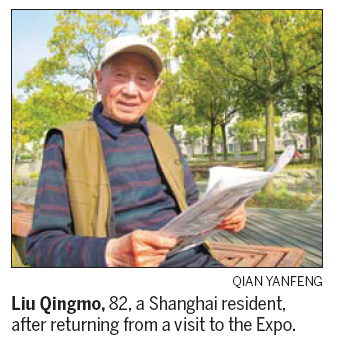What a difference an Expo makes

Liu Qingmo stood where his old home once was. He surveyed the area around him, looking for any traces of the past. He could not find any.
Liu, 82, was looking for potholed roads, dilapidated houses and putrid public toilets from the shantytown on the east side of the Huangpu River, where he had lived for a decade.
Instead, what he saw took his breath away. The ramshackle neighborhood he once knew became a modern, beautiful place and the embodiment of state-of-the-art architecture - the Expo Garden.
Liu said he was even more excited than when he moved into a new apartment four years ago to make way for the construction of Expo 2010 Shanghai.
"I'm happier because the Expo has not only improved my living conditions, but also brought the wonders of the world to my old neighborhood," said Liu after a visit to the Expo over the weekend.
To honor their contributions to the Expo, former residents like Liu were invited to visit the Expo Garden during the six-day trial that ended on Monday.
More than 18,000 households and nearly 300 enterprises along the Huangpu River, where the Expo site now stands, were relocated to the southeastern suburbs of Shanghai between 2003 and 2006. It was one of the largest relocation projects the city carried out.
Before the relocation, most people lived in dilapidated houses dating back to the 1960s. There was a lack of amenities and hygiene standards were poor. Liu recalled how he had to empty his waste into a nearby ditch and walk several minutes to collect tap water at a community water station.
From where his tiny 13-square-meter house used to stand, at Houtan Park in Pudong, Liu said he had the feeling of "traveling in a time machine".
"It was beyond my wildest imagination that such a marvelous transformation could take place in such a short period of time," he said.
"I have a hard time believing I'm at the same place I used to live," Liu said, adding that he would now have to resort to photographs to remember "the harsh old days".
Liu himself moved house only twice in the 60 years since he came to work in Shanghai from the neighboring Jiangsu province, both times to make way for urban development.
"I lived for nearly 50 years on the other side of the Huangpu River before moving across it to Pudong in the 1990s, so I'm a witness to the changing skylines along both sides of the river," he said.
Liu now lives in one of the two new residential communities, built to house those relocated from the Expo, about 10 km from the Expo Garden. Although far from the city center, Liu said residents enjoy much better air quality and shops are located nearby.
Now he can live with his son and granddaughter in an 84-square-meter apartment, a far cry from the tiny place on the Huangpu River he used to call home.
During his visit to the Expo, Liu did not enter any of the pavilions because of the long queues. Instead, he walked around the Expo Garden to remember what used to be there.
One thing that impressed him was how some of buildings in the Expo Garden had been rebuilt from old factories previously on the site, including the 165-meter-high chimney of an old power plant, which now serves as a giant thermometer.
"It evokes nostalgia for people like me and reminds us of the changes Shanghai has undergone," Liu said.
 0
0 







Go to Forum >>0 Comments